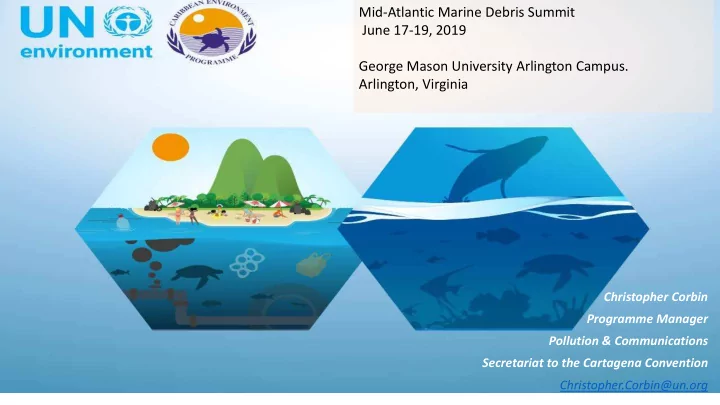

Mid-Atlantic Marine Debris Summit June 17-19, 2019 George Mason University Arlington Campus. Arlington, Virginia Christopher Corbin Programme Manager Pollution & Communications Secretariat to the Cartagena Convention Christopher.Corbin@un.org
Part 1 Let’s Take a Journey through the Caribbean Sea
Where do I begin?
WAS WASTE MO MOVE VES!
Part 2 Global & Regional Solutions
Global Commitments UN Resolutions & Political Commitments Sustainable Cities, Consumption & Production Waste Management Outlooks & Guidelines Scientific Knowledge on Plastics & Microplastics Green, Blue & Circular Economies (Waste as a Resource & Waste to Value)
#plasticfreejuly; #pickitup #litteringisnotcool; #zerowaste; #plasticfree; #strawssuck; Clea ean S Sea eas #refusesingleuse; #wepickupplastic; Beat Pl Plastic Advocacy Pollu lution Behavioral Change Ban t n the he Awareness Micr crobead Policy Change Break up up wit ith Pla lastics
#CleanSeasCampaign In Latin America & Caribbean 20 countries. Source: http://www.cleanseas.org/ 60
STATUS OF THE CARTAGENA CONVENTION & THE LBS PROTOCOL
About the Caribbean Node
Legislation, policies and enforcement Regional Frameworks Institutional frameworks and Stakeholder involvement Monitoring Programmes and Research Education and outreach Solid waste management planning
Part 3 Our Caribbean Reality
From here to there 19
20
Waste & Marine Litter Trends Most Tourism Dependent Region Waste Characterization & Generation Rates (Increase in Plastics from 5% to 35%) Climate Change Adaptation & Mitigation Increase of Waste to Energy Proposals Banning of Plastics, Styrofoam etc.
Sargassum Influx Acidification Coastal Development Sea level rise Sedimentation T emperature Invasive species Coral bleaching Water security Ballast Water Hydrocarbons Legislation Agrochemicals Policies Sewage Heavy metals Institutions Solid Waste/Plastics/litter POPs OVERFISHING
Systems: Lack of integration of marine litter into solid waste management frameworks Inadequate collection, recycling & recovery Inadequate reception facilities at ports & marinas 23
Information: P lastic use, sources, alternatives & impacts Business Models for Waste to Energy/Value Implications of bans, alternatives Barriers to Private Sector Involvement 24
Enabling Environment: Policy, Legislation & Enforcement Awareness, Attitudes & Behavior Political Priorities 25
Trinidad and Tobago High income Turks & Calicos High income US Virgin Islands High income St Kitts & Nevis High income St Maarten High income Anguilla High income Antigua and Barbuda High income Aruba High income The Bahamas High income Barbados High income Bermuda High income British Virgin Islands High income Cayman Islands High income Curacao High income Haiti Low income Belize Upper middle income Cuba Upper middle income Dominica Upper middle income Dominican Republic Upper middle income Grenada Upper middle income Guyana Upper middle income Jamaica Upper middle income Montserrat Upper middle income Saint Lucia Upper middle income S Vi & h G di U iddl i
The Bans in the Region The s study dy: Pres Pres esents t esents t the k the k e key a e key a ey aspec ey aspec ects o ects o of the of the e policies and regulatory instrumen e policies and regulatory instrumen ents t ents t that have b that have b been been en en implemented i implemented i in the W in the W Wider C Wider C Caribbean Region. Caribbean Region. Provid Provid ides lessons f ides lessons f for polic for polic icy makers w icy makers w who s who s seek t seek t to regu to regu gula gula late t late t the u the u use a use a and p and p productio productio ion o ion o of of disposable disposable le p le p plastic plastic ics. ics. BAN NO BAN BAN BAN IN BAN IN ANNOUNCED DISCUSSION – DISCUSSION – Public/NGOs Government (including Level Voluntary Ban)
500 #Plastic bags per person per The Bans in the Region year 200 170 140 Jamaica Jamaica European Australia World Union average In Jamaica, as of 2015, each person has been using almost 500 plastic bags annually, an estimated 75 per cent increase from 2011. Source: http://jamaica-gleaner.com/article/news/20180205/capri-reducing-scandal-bag-use-jamaica-ban-or-fee-denmark-first-country-tax
The Bans in the Region Composition of plastic at landfill (%) Antigua and Barbuda 19.5% 20 18 16 14 12 4.4% 10 8 6 4 2 0 2006 2008 2010 2012 2014 2016 Source: Antigua and Barbuda Department of the Environment, 2017. “Stages and implementation of Styrofoam ban.”
Part 4 Education & Outreach
Part 5 National & Community Actions
Pol olicy Sol cy Soluti tions: s: Sol Solid Was aste Awareness – Climate SIDS Specific Sustainable Regional Plan Behaviour Change Solutions Financing Change
Pol olicy Sol cy Soluti tions: s: P Plas asti tics cs Elimination of problematic or unnecessary plastic packaging Promote and/or products Reuse models where relevant, to reduce the need for single-use Encourage plastic packaging and/or products Incentivize Use of reusable, recyclable, or compostable packaging Increase Collection, sorting, reuse, and recycling rates Establishment of the necessary infrastructure and related Facilitate funding mechanisms/cost recovery Stimulate Demand for recycled products including plastics
Human Health Relationship Activities of the between cases of GPML-Caribe ZikV & marine debris density Link Between Marine Litter and Zika
Microplastics in Fish
Microplastic in Commercially Exploited Fish from Grenada, West Indies
Part 6 Where do we go from here?
Lessons Learned Job Opportunities Community Leaders Targeted Messages Partnerships
www.gpml-caribe.org
Strategic Planning for Marine Litter Activities in the Caribbean Region Sustainabil ility
Research and Governance Monitoring Four Themes Capacity Communication Building & Training
Pollution (LBS) Protocol Marine Litter/Plastics included as priority pollutant - SDG 14.1 Research Impacts of plastic on human & ecological health included associated economic costs. Sustainable Consumption & Production Solid waste generation is expected to increase; Reduction of the influx of waste os required as well as change in consumption; Appropriate Technologies; Integrated Waste Management The new Rs – Refuse, Repurpose, Re-engineer; Land & Marine-Based Sources;
T HANK YOU United Nations Environment Programme Caribbean Environment Programme 14-20 Port Royal Street, Kingston, Jamaica Tel: +876-922-9267; Fax: +876-922-9292 Website: www.unenvironment.org/cep Facebook: UN Environment-Caribbean Environment Programme Twitter: @UNenvironm_CEP
Recommend
More recommend